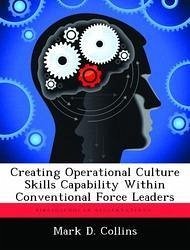This monograph analyzes the Army's ability to implement operational culture skills to meet the intent of the vision set forth in the 2009 Army Culture and Foreign Language Strategy. First, the monograph reviews Army operations since Vietnam. This is used to draw conclusions on how the conventional or general purpose force leader did or did not utilize language and culture in Army operations up to the 21stCentury wars in Iraq and Afghanistan. Then the monograph uses Department of Defense guidance to establish the need to change. Next the monograph looks at the Army's challenge of institutionalizing operational culture skills. It is done against the backdrop of the current conflicts in Afghanistan and Iraq to find systemic issues that arise when conventional troops operate within foreign populations. The U.S. Army gained a considerable amount of experience recently in Afghanistan and Iraq. In both wars, the Army had to come to grips with operating among foreign populations who were markedly different from typical American demography. This monograph promotes the concept of combining cross cultural competencies, nominal language proficiency or language use and regional orientation as operational culture skills. The monograph identifies the need to take Department of the Army level vision and turn it into action. It highlights the importance of cultural awareness and language use during the conduct of operations by conventional force leaders. The monograph concludes with an analysis of lessons learned from Afghanistan and Iraq. The monograph points out that unless there are changes made to the way the Army trains and educates its conventional force leaders on operational culture kills it will not have the necessary operational capabilities to meet the challenges of future operational deployments. The monograph recommends that the Army institutionalize the acquisition of operational culture skills developing a cost effective comprehensive program to enable leaders in gen








